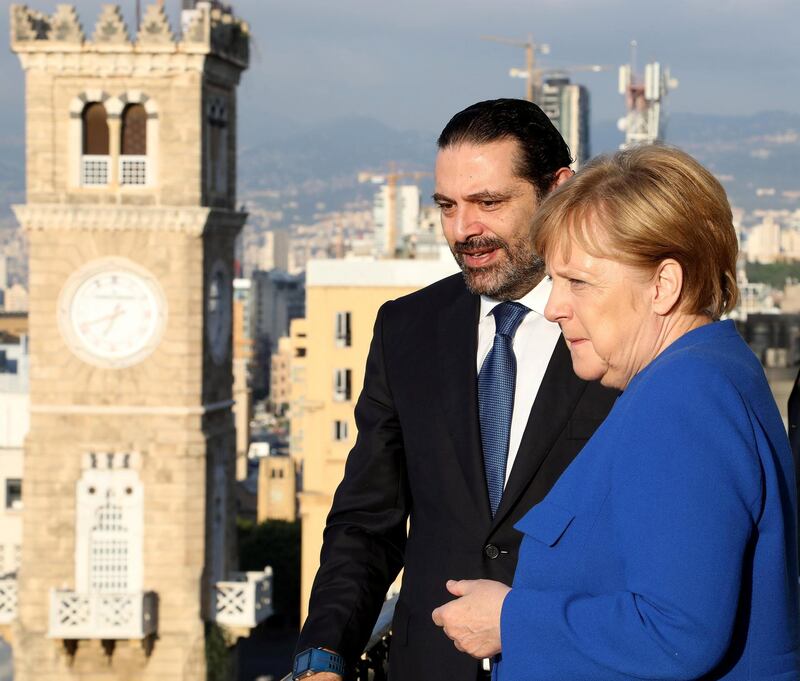Although she may be thousands of kilometres from the political troubles around resettlement of Syrians back home, the issue of refugee support will be at the forefront of German Chancellor Angela Merkel’s visit to Beirut.
Her two-day visit to Jordan and Lebanon that started Thursday are to two countries hosting large Syrian refugee populations. While in Amman, she talked of help for the government in economic reforms, but her meetings in Beirut are set to be a lot more delicate.
Earlier this month Lebanon’s Foreign Minister Gebran Bassil ordered a halt on new UNHCR work permits, claiming the agency was trying to discourage refugee returns. As the lead agency tasked with supporting and coordinating support for the 1 million Syrians registered in Lebanon – although the government places the true number of Syrian refugees in the country at upwards of 1.5 million – freezing UNHCR permits could have massive repercussions on the small eastern Mediterranean country of 4.5 million already struggling with aging infrastructure, poor service provision, high unemployment and spiralling debt.
“The main issue for her here will indeed be refugees and seeing how to support Lebanon in this,” said Bente Scheller, the director of Heinrich Boll Stiftung, a think tank in Beirut affiliated with Germany’s Green Party.
Although far from home, Mrs Merkel has a lot at stake.
Germany has become the second largest donor to the UNHCR and provides vital funding for agencies such as the World Food Programme that have large operations in Lebanon and is likely to take a dim view of Mr Bassi's recent stance.
German officials also attended the three major donor conferences – for the Lebanese army, the country’s economy (known as the CEDRE conference) and to support refugees and host nations.
Mrs Merkel is scheduled to take part in a roundtable on economic issues on Friday along with Lebanese and German businessmen. There has been speculation that she might make further pledges of economic assistance during her visit.
But crucially, a lot of the international assistance is forthcoming because Lebanon is supporting refugees – a message that jars with Mr Bassil’s recent policy.
“It’s a continuation of what the German government has been doing since 2012. It’s a strong message of support economically for Lebanon after the CEDRE conference but also support for refugees and Lebanese hosting communities,” said Malte Gaier, the Beirut director of Konrad Adenauer Stiftung, a think tank affiliated with Mrs Merkel’s Christian Democratic Union.
“It should be a top priority to have a stable Lebanon and it’s in light of this that the chancellor is coming today to Beirut," he said.
During her visit to Beirut, Mrs Merkel will hold several meetings with prime minister-designate Saad Hariri who has been corralling much of the international support for Lebanon.
But Mr Bassil and others have made repeated veiled threats, phrased as warnings, to the likes of Germany and the EU. Without more international money, they say, refugees living in dire conditions in Lebanon will start leaving for Europe.
For Mrs Merkel, already facing a revolt over her acceptance of Syrians, the idea that another million could head her way is concerning.
_______________
Read more:
[ Angela Merkel faces battle over European migration reform ]
[ Lebanese foreign minister battles UNHCR over refugee policy on return ]
[ Hardline European states snub migrant summit ]
_______________
“Her government is in trouble because of the controversy over immigration – [rival political parties] are trying to put pressure on Merkel to close the borders,” Ms Scheller said. “It’s quite a difficult time for her to come here and address the refugee issue.”
So the issue of migration will likely be at the forefront of the Lebanese leg of the visit, but it is also an enduring legacy of her time in office so far.
“She’s been identified with this whole issue of refugees and migration – I wouldn’t reduce her entire chancellorship to this, but nevertheless she has widely been identified with it,” Mr Gaier said.
And this does not seem to be about to change, despite her troubles back home.
Speaking to students at the German Jordanian University on Thursday, she said: "I am on the side of those, and this is, fortunately, the majority in Germany, who say we need to be an open country." - Additional reporting by David Enders in Beirut






